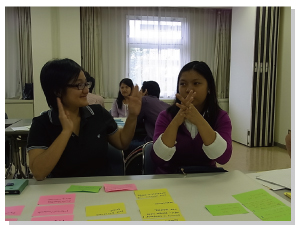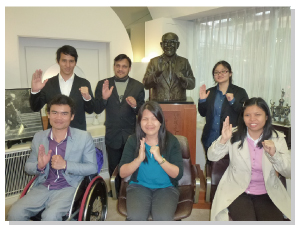- HOME
- Alumni News
- Irish Ayesa Mendez (15th trainee)
- Irish's Final Report
Irish's Final Report
Diversity of Needs Seen in the Classroom: What I Learned in Japan
1. What I did in Japan
The Duskin training program consists of three main parts. First, I had to study Japanese. Next, together with the other trainees I learned about a variety of disability-related issues in Japan. I compared Japan with the Philippines on the situation disabled people are in, and got many ideas of how to support my fellow country people with disabilities. Finally, individual training composed the third part of the program.
2. What I learned in Japan
Before arriving in Japan, I was hopeful. I wanted to study education for children with disabilities in order to become a teacher. Accordingly, for five months I have visited a number of special needs schools, schools for visually impaired children, and elementary and junior high schools, where I observed lessons and spoke to teachers. The focus of my individual training was on inclusive education. While Japan had a large number of special-needs schools, inclusive education was not so common. It is not easy to implement inclusive education. Some students with disabilities do go to local schools, but it cannot be said that they receive adequate support. I have seen many cases where both teachers and students themselves are trying hard. The situation is similar to that in the Philippines. As a result, I have observed few inclusive classrooms. Instead, most of what I have visited during my individual training was special needs education. However, as I studied I realized that so much of special needs education could be applied to inclusive education. I will summarize what I have learned through the training below.
(1) Student-support systems
Cooperation is a key to education. For example, Nippon Lighthouse offers free braille textbooks, translated by volunteer workers, to local students who are blind. This enables blind students to go to a local, regular school where only printed textbooks were available for free. This support service is extremely useful, and all schools should cooperate with voluntary groups in the community. Moreover, I have attended numerous science lessons at Tsukuba Special Needs School for the Visually Impaired. Science subjects are of particular difficulty for those who cannot see. Therefore, teachers cooperated with one another in order to generate inventive teaching methods. Whenever they got an idea, they tried it out in their classrooms. In contrast, few teachers in the Philippines are used to teaching students with disabilities. Thus, any teacher with a disabled student in class ends up struggling alone. She is unlikely to find any support group, so the student is very difficult for her. It is very important to provide support to teachers.
(2) Creativity
Mr. Ishizaki of Tsukuba Special Needs School for the Visually Impaired is a physics teacher. To my amazement, he was making laboratory experiment items by himself. Generally speaking, devices and equipment made for people with disabilities are very expensive, so the teachers I have met were creating teaching equipment out of ordinary materials. Schools in the Philippines too have very limited budgets. Therefore, the idea of making teaching equipment out of inexpensive materials would be useful. With such equipment available, disabled students can be taught with nondisabled students in an ordinary school. Ideally, small-group inclusive teaching would be employed. Universal design of learning materials is an important part of inclusive education.
(3) Identity formation
The personality of students matters a lot in inclusive education. Talkative students, for example, can easily make friends with many of their classmates. In reality, children with disabilities tend to be shy and quiet, therefore they need support here from people surrounding them, such as their teachers. Opportunities should be given to them that can enhance their social participation in the future. I met a young girl enrolled in Tsukuba Special Needs School for the Visually Impaired, who attended a regular kindergarten in the community once a week. There she had the opportunity to mix with local children, with whom she became friends. This experience would certainly help her make friends with people she meets in the future.
(4) Education looking to the future
Individual education support is imperative not only in special needs schools but also in inclusive educational settings. In particular, making plans for future career development of students is a key. Indeed, students with disabilities need to start preparing for their future at a young age. I visited Koyukai (Light Friend Association) and Taiyou-no-Ie (Japan Sun Industries), both located in Kanagawa, where disabled people were assigned to specific work. I learned that it would take really a lot of time to prepare for a job, thus people with disabilities must start early.
3. My personal development
Now I would like to talk about my own self-development. I have had so many new experiences, both joyful and tough, in Japan. One of the gifts from these experiences has been a change in my values. For example, for the first time in my life I have lived with people who were not my family. This has made me consider and work hard on how to develop good relationships with my co-residents. However, the most striking experience was that I got glaucoma and was hospitalized for treatment. Then the doctor told me that I would have to go through surgery. This experience was extremely challenging, but also gave me a gift – I attained two important leadership values; a person who will act as a leader must be strong and able to make decisions. These two values are very important for a leader, who is likely to face various challenges. As this incident shows, the source of my learning was not limited to my training. I have learned so much from my everyday life in Japan. I can see how lucky I have been; there are things that cannot be taught in the classroom. Important values are among the things that can only be learned outside the classroom. Based on my own experience, therefore, I believe that hands-on experience should compose an integral part of inclusive education.
4. My next step – what I plan to do in the Philippines -
The first thing I have to do after returning to my country is to deliver a presentation on my Master’s thesis at university. My research focus is on students with low vision attending regular schools. As little scholarly attention has been paid to people with low vision, my study, I believe, is making a significant contribution. Next, I wish to find a teaching job. Ideally, I will work for a school implementing inclusive education. And I wish to make use of what I have learned in Japan in my teaching career. I aspire to become an expert in the field in the future, so I would like to develop my teaching experience. In addition, I plan to join in the NGO that runs computer lessons for people with visual impairment. What I can do is limited, but I am determined to work for the benefit of students with disabilities in my life.

5. My gratitude
I would like to express my sincere thanks to my teachers and people I have met during my individual training, to my host family, to the staff members of the Duskin AINOWA foundation and to the JSRPD, as well as to those I have met during my stay in Japan. Thank you very much indeed.





